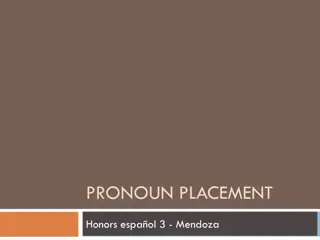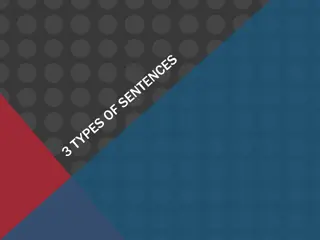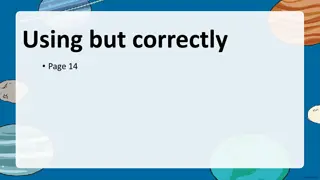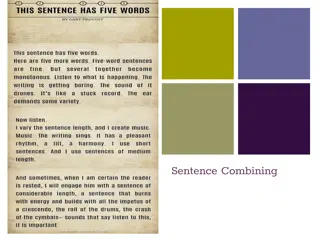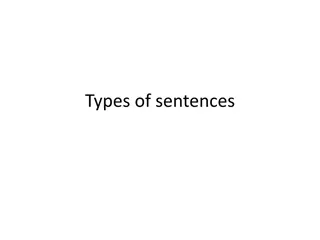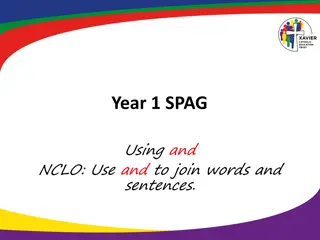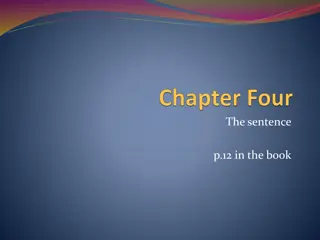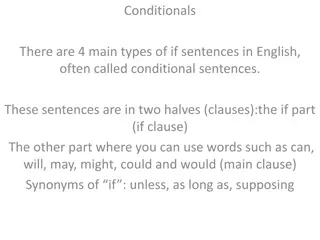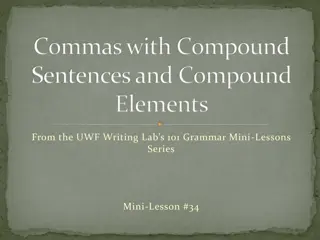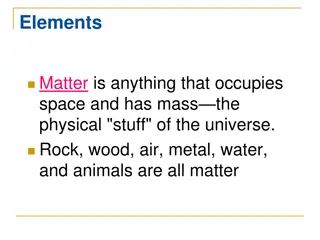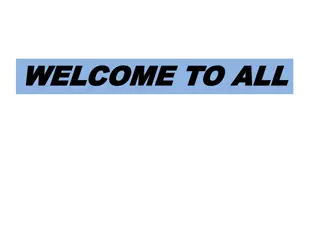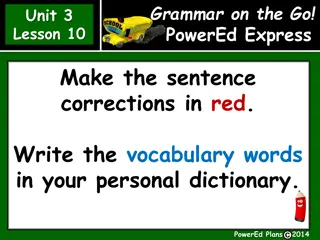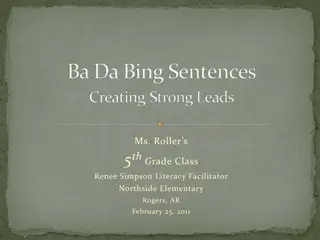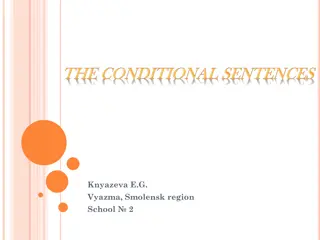Understanding Sentences: Elements, Types, and Structure
Explore the essential elements of sentences, including subjects and predicates. Learn how to identify subjects and predicates in sentences to ensure they make sense. Discover examples of complete sentences and the components that make them whole.
Uploaded on Sep 27, 2024 | 0 Views
Download Presentation

Please find below an Image/Link to download the presentation.
The content on the website is provided AS IS for your information and personal use only. It may not be sold, licensed, or shared on other websites without obtaining consent from the author. Download presentation by click this link. If you encounter any issues during the download, it is possible that the publisher has removed the file from their server.
E N D
Presentation Transcript
Sentences: Elements, Varieties, Patterns, Types Sentences: groups of words that express complete thoughts.
I. Sentence Elements Sentence phrases, and clauses. elements: subjects, predicates, Complete Sentences: sentences must have subjects and predicates, and they must make sense.
I.A. Must Have a Subject Every sentence must have a subject. A simple subject is a noun or pronoun that tells who or what the sentence is about. The complete subject of a sentence includes the simple subject and all of its modifiers (words that describe or limit). You can locate the subject in a sentence by asking, Who or what is being discussed? - Rohima wanted out of her dead-end job. (Who is being discussed? Rohima) - Positions in many companies are advertised online. (What is being discussed? Positions)
I.B. Must Have a Predicate Every sentence must have a predicate. A simple predicate is a verb or verb phrase that tells what the subject is doing or what is being done to the subject. The complete predicate includes the verb or verb phrase and its modifiers, objects, and complements.
Here are some examples of complete sentences. The simple subject in each sentence is the red ones, and the simple predicate is the blue ones. Notice that a sentence can have more than one simple subject and more than one simple predicate. Simple Subject The new CEO of the company introduced himself and outlined his plans. All employees in the company may choose from a benefits package. She and I will be applying for jobs after graduation. The person who sent the e-mail might have been a customer. Simple Predicate
The verbs in the predicate may consist of one word (received ) or several (will be applying). In a verb phrase such as will be applying, the principal verb is the final one (applying). The other verbs are helping verbs, or auxiliary verbs. The most frequently used helping verbs are am, is, are, was, were, been, have, has, had, must, ought, can, might, could, would, should, will, do, does, and did.
I.C. Must Make Sense In addition to a subject and a predicate, a group of words must possess one additional element to qualify as a sentence. The group of words must be complete and make sense. Observe that the first two groups of words that follow express complete thoughts and make sense; the third does not. Simple Subject Simple Predicate Athletic shoe makers convinced us to buy $150 tennis shoes. (Subject plus predicate making sense = sentence.) Anthony now owns different athletic shoes for every sport. (Subject plus predicate making sense = sentence.) Although sports shoe manufacturers promote new versions with new features. (Subject plus predicate but NOT making sense = no sentence.)
Recognizing Phrases and Clauses Sentences are made up of phrases and clauses. Learning to distinguish phrases and clauses will help you build complete sentences, use a variety of patterns, and avoid common sentence faults in your speaking and writing. Phrases: A group of related words without a subject and a verb. Kinds of phrases: noun, verb, prepositional, infinitive, gerund, participial VP Prep. P Prep. P (The alarm) (was coming) (from another part) (of the building.) NP
Clauses: a group of related words including a subject and a verb Clause Clause (We interviewed three applicants), and (we decided to hire Rohima). Clause Clause (Karyo would go to the cinema after he finished his work). Clauses may be divided into two groups: independent and dependent. Independent clauses are grammatically complete. The employees need help. Dependent clauses depend on their meaning for independent clauses. Dependent clauses are often introduced by words such as if, when, because, after, while, before, although, and as. Dependent clause Independent clause When employees need help, Adam solves our technology problems.
II. Sentence Varieties Sentences may be divided into four groups: simple, complex, compound, and compound-complex. A simple sentence, shown in the following example, contains one independent clause (complete thought) with a subject (the red ones) and predicate (the blue ones): Our team completed the project. A compound sentence contains two complete but related thoughts. The two independent clauses may be joined by a: (a) coordinate conjunction: for, and, nor, but, or, yet, so (fanboys) or; (b) semicolon; or (c) conjunctive adverb such as however, consequently, and therefore. Notice the punctuation in these examples: The team project was challenging, and we were happy with the results. The team project was challenging; we were happy with the results. The team project was challenging; however, we were happy with the results.
A complex sentence contains an independent clause and a dependent clause (a thought that cannot stand by itself). Dependent clauses are often introduced by words such as although, since, because, when, and if. When dependent clauses precede independent clauses, they always are followed by a comma. When we finished the team project, we held a team party. A compound-complex sentence contains at least two independent clauses and one dependent clause. Although this team project is completed, soon we will begin work on another; however, it will be less challenging.
III. Four Basic Sentence Patterns Pattern No. 1: Subject Verb In the most basic sentence pattern, the verb follows its subject. The sentence needs no additional words to make sense and be complete. Subject We Everyone She Employees Verb worked. is studying. might have come. are being informed.
Pattern No. 2: SubjectAction VerbObject When sentences have an object, the pattern is generally subject, action verb, and object. Objects of action verbs can be direct or indirect. A direct object is a noun or pronoun that answers the question What? or Whom? Subject Action Verb Luke needed He and a friend questioned The sales manager provided Direct Object a new car. (Needed what?) the salesperson. (Questioned whom?) good answers. (Provided what?)
Pattern No. 2 may also use an indirect object that answers the question To whom?, To what?, For whom?, or For what? A sentence can have both an indirect object and a direct object. Subject Action Verb Indirect Object Direct Object This dealership promises The manager handed The technician gave customers good prices. him the keys. the vehicle a tune-up.
Pattern No. 3: SubjectLinking VerbComplement The subject comes before a linking verb and its complement. The common linking verbs are am, is, are, was, were, be, being, and been. Other linking verbs express the senses: feels, appears, tastes, sounds, seems, looks. A complement is a noun, pronoun, adjective or adverb that renames or describes the subject. A complement completes the meaning of the subject and always follows the linking verb. Subject The instructor Our customers Your supervisor The callers My job These Web sites The new students are Linking Verb was are is might have been is seems Complement Connie Murphy. friends. she. they. challenging. useful. in Room 3402.
Pattern No. 4: Inverted Order In inverted sentences, the verb comes before the subject. You might use inverted order for variety or emphasis in your sentences. Sitting in front is Michele. Working hardest was the marketing team. In questions, the verb may come before the subject or may be interrupted by the subject. What is his e-mail address? Where should the invoice be sent? In sentences beginning with here or there, the normal word order is also inverted. Here are the applications. There were three steps in the plan.
IV. Punctuating Four Sentence Types Because sentences express complete thoughts, they must include end punctuation. Statements: A statement makes an assertion and ends with a period. Laws require truth in advertising. Manufacturers today must label the contents of packages. Questions: A direct question uses the exact words of the speaker and requires an answer. It is followed by a question mark. How many e-mail messages do you receive each day? What are your peak message hours? Commands: A command gives an order or makes a direct request. Commands end with periods or, occasionally, with exclamation points. Note that the subject in all commands is understood to be you. The subject you is not normally stated in the command. Shut the door. ([You] shut the door.) Insure your home against fire loss. ([You] insure your home . . .) Exclamations: An exclamation shows surprise, disbelief, or strong feeling. An exclamation may or may not be expressed as a complete thought. Both subject and predicate may be implied. Wow! We just had an earthquake! What a wonderful time we had! How extraordinary [that is]!
PRACTICE 1 Indicate whether the following word groups are phrases (P), independent clauses (I), or dependent clauses (D). (Remember that phrases do not have both subjects and verbs.) Capitalization and end punctuation have been omitted. Example: in the spring of this year --P Hilda goes Kokas on Sundays. ---IC-- before Hilda goes to campus ----DC-- 1. when you account for cultural differences --- 2. Microsoft and Google approved of the new Internet regulations --- 3. recently they acquired an option to purchase the property --- 4. before anyone had an opportunity to examine it carefully --- 5. during the middle of the four-year fiscal period from 2008 through 2012 --- 6. if you want to apply for the job --- 7. the merger was approved by stockholders --- 8. should have been in the room --- 9. because we recommend new tax regulations --- 10. is counting on a raise ---
PRACTICE 2 A simple sentence has one independent clause. A compound sentence has two or more independent clauses. A complex sentence has an independent clause and a dependent clause. A compound-complex sentence has two independent clauses and a dependent clause. Indicate whether the following sentences, all of which are punctuated correctly, are simple, compound, or complex. Example: Bejo will get a promotion, if he performs better. CS-- 1. Sharon conducted research on blogs. 2. Sharon conducted research on blogs, and she shared her findings with other department members. 3. Management trainees are sent to all our branch offices in this country and to some of the branch offices in South America and Europe. 4. You fill in all answer blanks on the application, and you send the completed form to the human resources director. 5. When you receive a response, please let me know and I will try to fix it.
6. In 1994 Southwest Airlines issued the industrys first e- ticket. 7. Before arriving at the airport, many airline passengers now check in online for their flights. 8. John maintained control of his disabled US Airways plane. 9. John maintained control of his disabled US Airways plane and he successfully landed it in the Hudson River. 10. If you have sensitive data on your mobile phone, you erase or encrypt it before throwing or giving the phone away. 11. The best companies embrace their mistakes.
Reference: Guffey, M.E., & Seefer, C.M. 2008. Business English, 10thEd. South-Western. Cengage Learning



